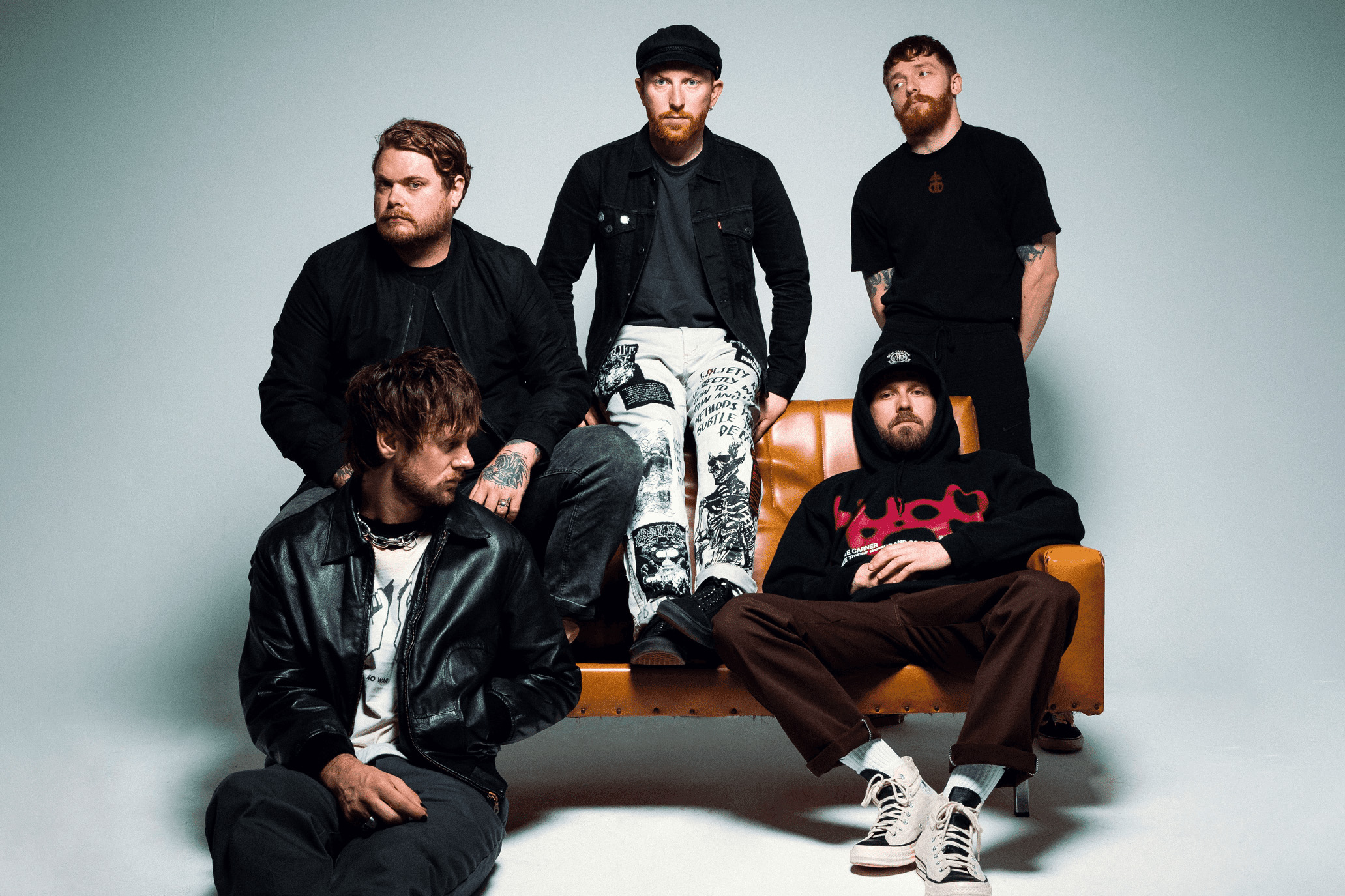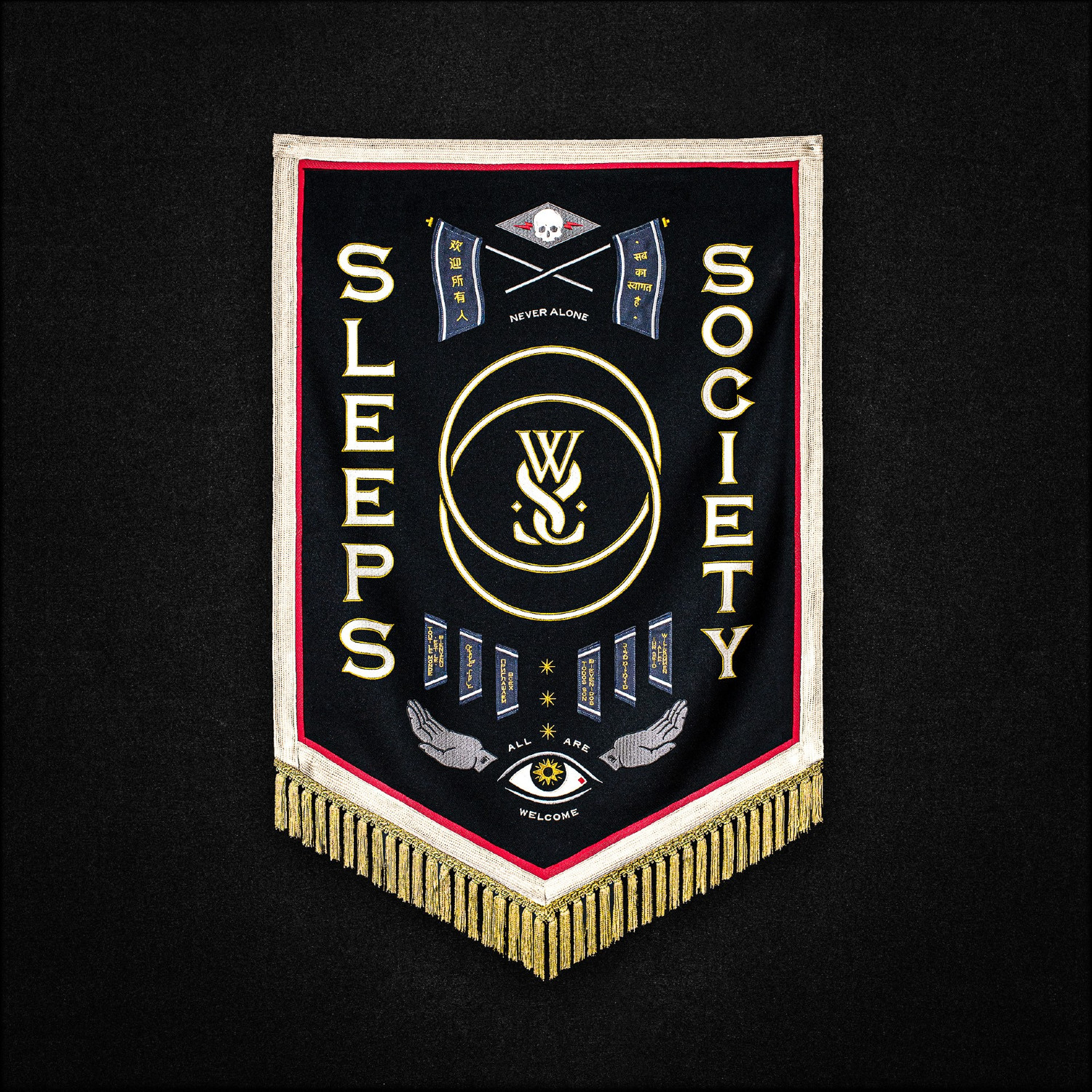Interviews
While She Sleeps Guitarist Mat Welsh on Changing the Music Industry with Their New Album ‘Sleeps Society’
While She Sleeps guitarist Mat Welsh talks about how they hope to change the landscape for bands with their ‘Sleeps Society’ model.

For any group, to put out a fan-funded project is a brave move, let alone to do it during the middle of the biggest crisis the industry has faced in a long time. However, for Sheffield metallers While She Sleeps, their new project, dubbed Sleeps Society, isn’t just another fan-funded album. Hoping to shift the landscape for bands, providing them with a sustainable future, While She Sleeps are planning a bright future, for not only themselves but also the stars of the future. With support from the likes of Simon Neill from Brit rock giants Biffy Clyro, things are certainly heading in the right direction so we spoke to Sleeps guitarist Mat Welsh about their plan.
Thanks for your time Mat. How are you doing?
Mat Welsh: “Yeah, I’m good thanks.”
So we wanted to chat about the new record and the concept. It was quite a brave move but seeing it chart as high as it did, do you feel like that justifies the kind of path you took with it?
“Oh, definitely. We had the figures to say where we’d be in the charts, but it wasn’t officially counted because of the way we distributed it. But yeah, I mean, that was one of the certifications, if you can put it that way. For me personally, I can say I’m glad we did it this way. Then, as well, the success of the Sleep Society in itself, and like the Patreon, that was a huge part of the record success for me.
Having those things both work, like being able to distribute independently, and succeeding physically and logistically getting all those orders out to people without being damaged and on time, all that kind of stuff. Then the Sleep Society being a model that’s being sort of proving to work, that’s what I wanted from this album. I was very aware that we were the sort of crash test dummies for this idea and this model. We’re not by any means the first band to do this kind of model in terms of a subscription thing, but maybe we’re the first to put so many eggs in that basket and not just do it as a side hustle.
We did a crowdfunded album in 2017 which was what sort of opened the doors into that, like, maybe it’s just all doable being directly fan-funded. We had such a good experience that it was like fuel in the fire. It gave us hope that this would be a thing. With things like Pledge, or crowdfunding an album, its longevity in lumps, because it’s just an album. With this one, we needed it to change the way the band survives. This will continue forever, really. The goal is for this to be the continuation of how we become sustainable, basically.
So I did a lot of research, talking to people who have subscription models, and people who use the different platforms and people who have fan communities and, and tailored fan communities, not just the ones on social media, basically. No one had done it and, to be honest, most people I spoke to were kind of like podcasters, YouTubers, those kinds of things, it’s more used in that department.”
In terms of the timing, it’s been a tough 12 months for everybody and money is scarce across the board, purse strings have been tightened, and people have not got a lot of money to spend. What’s the feedback been like from people?
“They’ve absolutely loved it. It feels like we’ve got closer to them, which was the goal. I think they feel really responsible now because we have this interesting model and it doesn’t require us to have every single one of our followers turn into society members. It’s actually the way this model could work for other people where your ultimate fans, your absolute diehard fans are the people who join.
If each band’s diehard fans supported their band, that’s how kind of everyone could survive. We’ve got a place to talk to them and we do things constantly, like every week, we have a meeting on a Monday. We work out what we’re doing every day for a piece of content for the Society for the different tiers. We use them as this like, they’re like our Board of Trustees in a way. Like, we asked them about what they want us to do. Do they want us to go live when we’re practicing? Or would you rather do like a Q&A in the evening? What kind of merch would you like us to print? Just using them like that. We fill them in on everything that’s happening a little bit earlier than we do the public just keeping that like inside scoop up. It’s resulted in this really cool thing where everyone feels a real level of ownership to it.
We’ve done small events over the last couple of weekends. We did a pop-up shop in Sheffield, a pop-up shop in London. From the first moment came up with the idea, a lot of it revolved around physical, in-person things like members-only shows, little secret shows in amongst the big stuff. Workshops and tutorials and those kind of things. We obviously had to change the way we do that but the stuff we did for the last couple of weeks was the first moment of doing in-person stuff. People were coming and it was like a community. A lot of them just used it as a massive opportunity for them all to meet, because they’ve all been speaking online for this long, everyone met up. It was this absolute force of people who were a community itself. It’s load of people in there not just trying to speak to us but just as interested in speaking to each other. This was just the kind of something that you can’t do as easily on Instagram or Facebook.
I look at it like, when we were kids, it was that thing where you see someone in a hoodie and you had that instant connection. I would see someone in like a NOFX hoodie. I’ve got my NOFX hoodie on and this is the same thing for that. Whatever this sort of counterculture is, this is a cool thing. It’s like a load of people who feel like they’re outsiders but when they all meet up with each other, it becomes this awesome community, which is what drew me into this world in the first place. This time though, they felt like our community.”

Artwork for ‘Sleeps Society’ by While She Sleeps
You’ve talked about, obviously, the diehard fans for each kind of band but, what about the bands? Have you spoken to other bands about this model?
“Yeah, we talked to a few bands who we know have done it. I’m getting hit up quite regularly by people saying they’re thinking about doing it which is amazing for us because that’s what we very much want. We want to be the crash test dummies, as I said. We don’t want it to be ‘our thing.’ We want it to be a conscious movement of a lot of bands. This could be the difference between us packing it in when we’re 35 because it’s not sustainable for us to live a real-life and buy a house or learn to drive whatever you want to do that certifies sort of growing up. We wanted this to be a thing to say you can have the life you want if you want to be in a band. It can be a sustainable, good career. It can be a legitimate thing.
If you’ve got say a 16 year old who is being told that it is going to be about twelve to 15 years before you can really start to stand on your own to feet, you’re going to wonder if this is the thing for you. You’d start to look elsewhere for your dream job. But, with this, it’s like here’s your new way to do it.
I did something recently with the Bristol Institute of Music, they’re doing a case study on Sleep Society, they’re watching how it trends which, for me is an ultimate reward. The fact that it’s getting watched and getting discussed as a realistic option for people who want to go into the music industry, which I suppose kind of goes back to the original question about does it kind of justify taking that risk.
I mean, the route absolutely is tough. This is my first record with me officially managing the band. I’ve always been that that figure inside the band, but we’ve always had a manager like in contract, and we made the decision because I think that I can do it. There’s been a proper learning curve, but it’s also a massive challenge and a prove yourself moment for me to show I can actually steer the ship.”
You collaborated with Simon Neill from Biffy Clyro. Before we get onto that, they’re a band that are at a different level to a lot of British bands. Did you speak to them about the model you had planned for this record?
“Well, honestly, when I pitched the idea to Simon about the whole thing and got like a contact for him through someone he was so supportive. We did a tour a few years ago, and someone said, that Biffy were fans of the band. I have always wanted to find a way to contact them and I got a friend of ours who knew their tour manager to get in contact. I messaged him and then he came back and he was so friendly. He put me in touch with Simon, I pitched what we were doing and how we’re trying to take in a different direction. I told him that the song that we wanted him to be involved in was to try and publicize the idea of speaking openly about mental health.
Simon came back and it’s hard to put into words the energy and vibe that came across in an email, but he has a means of putting a really, really good vibe in an email. He was just all over it. I think he said something about how he’d been a fan of the band since This Is The Six and how he was a massive fan of the way that we operate. I didn’t even know he was paying attention, never mind paying attention to the kind of that level, the attitude that we have as a band, and what we’re trying to do for the industry.
So, that initially was so cool. As for the song, he was as much on board with the musical side of the song as he was the message. I was sending him bits of the videos we were making back and forth. It was weird because I’m thanking him for being part of it but he was absolutely thanking us for letting him sort of help be part of it, which is nuts. The response to the song has been really cool as well. I think it has been our fastest-growing song in terms of streaming. We think of Biffy as an absolute giant. They’re a juggernaut in terms of British rock bands. I have a massive amount of respect for them because, as far as I’m concerned, they’re about as true as you get. They’ve done what they want consistently. They’re not trend followers. They’ve just been themselves musically. And they’ve kind of let everyone else just catch up around into what they’re doing.”
It’s a huge sounding record and it’s quite a diverse record as well. I mean, it’s not a metalcore album, it’s not a rock album, it’s just a lot of everything. How challenging was it to write the record like that during lockdown?
“It was fun, to be honest, it was a really fun record to make. We’ve learned now that the records can be horrendous to make. We’ve had like (lead singer) Loz (Lawrence Taylor) has had throat surgeries. We’ve had multiple members suffering from massive mental health issues. I’ve had a couple of health issues during studio time and things like that. And just the stress you take on by trying is not something that you turn off when you go home. It’s like we’re trying to make our ultimate best record ever. We’re trying to make a record that, if this was your last album, we had given it everything. What if you don’t have a chance to make another record? We’re always like that. They take us ages and they can sometimes we’re just shells by the end of it because we just killed ourselves to make it.
So, for this one, trying to get everyone’s physical and mental health to all be good is quite a tall order. And you know, like five people, all in a good place? We’re talking no breakups, no addiction problems, everything aligning right. So What!?, the record before, was a bit of a nightmare to make. We had Loz in and out of throat surgery, (guitarist) Sean (Long) was having a terrible time, his mental health. I had my appendix out and it went wrong. I got sepsis. All at the same time. It was a disaster.
For this record, we decided to chop the process in half and do five songs with a couple of months in between them. We decided to write for a few months, record five, then have a couple of months to work on the next five and just sort of polish them up. We just did one song until completion and then the next song until completion. It enabled us to keep up a level of excitement for each song. We stayed on topic for each song. We were all in a good place, feeling fun, creative, we were excited.
The main inspiring aspect of this album was the way we were going to do it. It was this idea about it being this new move. We were starting this fucking community which is about to transition from a traditional industry model. It was encouraging for us to be daring and do things that we might not have done and it was actually really fun to make. I think that’s why the record feels quite entertaining.”
We spoke about Simon already and the subject of the song, mental health, is a big, big thing. As you said, there’s obviously been issues with mental health within the band in the past. What’s it been like during lockdown?
“This record has been our saviour because, we were in America when it kicked in, and we flew straight home. We lost the end of the shows in California, lost the rest of the shows and flew straight home. We were talking about this all the way through that. I was planning this idea and then we had a year to plan it so we said that, if we got him home and the brakes are being put on, then let’s just write straight away. If writing goes well then let’s record straight after that. So, we went home and just basically all wrote for a month through the first lockdown. Sean lives next to where our studio is so we built a studio, like a headquarters and he was in the studio all the time, just on his own. We were communicating by sending videos then, as soon as we got approval that we could go to work, we started going and just writing in the same room.
It weirdly felt like the year wasn’t that big a shock to us because we managed to just stay completely on one focus all the way through it. So while everyone else was experiencing everything really grinding to a halt, we were sort of ploughing on with this little project. It was consuming our focus, which is really good because it’s been a fucking disastrous year for a lot of people around us. I’ve watched people fall apart and like, yeah, we’ve lost mates this year. I almost feel bad in some ways now because we were so consumed in our project that I probably didn’t know how much some of the people were being affected by it. It was definitely like it was a weird blessing in disguise to have the year and it opened the gate a gateway for us to think.”
On the track “Systematic” you’ve described it as a massive fuck you to the doubters. From the early days, what’s been the driving force to keep you going?
“I think we’re a proper problem solver band. We’ve been in so many situations like we found ourselves in like a quarter of a million pounds worth of debt before that we didn’t know about that people were like, basically, like hiding from us in the industry and people suggested shit like liquidating, because that’s how you can get rid of it. Every time those things happen, I’m just like, Are you fucking kidding? I’ve put 15 years into this thing. Not a chance. I’ll fix that problem and we’ll be stronger on the other side of it. I love that.
As soon as I went to secondary school, I knew exactly what I wanted to do. I literally went and spied on people who were in like drum lessons. All my life, the majority of teachers, people like that were always telling me I should have a backup plan and how it wasn’t a real option. I sort of get off on proving people wrong. Proving people who doubted wrong and yeah, and that’s been an undertone in Sleeps forever.”
Ok, on the subject of the music industry, what you’ve achieved and the level you’re at now, what’s the most important lesson you’ve learned?
“When people tell you to let go of control make sure you know that they care about it in the same way you do. I’ve been told to let go of every sort of managerial focus of the band, to let someone else do it. It’s very much just their job whereas with us it is not. There is a real difference between a job and a passion. Some of the biggest mistakes we’ve made are put our trust in people to treat it with the same level of care as we do and instantly found out that we’ve been let down because we’ll put our absolute fucking blood into this thing but then we give it someone else to do something with it and, suddenly, it’s not handled not very carefully. Why did we need someone to do the same thing and expect the same level of care we would have? I think just choosing the people you were with so important. We’re a band that cares about every single little thing we do. It is why it takes so long to do a record. We design all our own merchandise. We do all our own art.
Every idea has come from inside this thing because, for me, that’s the only true way to represent yourself. My biggest thing is that you can hand it over to someone and it can be stripped of its magic, and you got to be careful. Someone said that a producer’s job is to acknowledge the magic of a band and then transport that magic onto a record safely without damaging it. It’s not about fixing or making it better. And I always thought that was like the best thing, the best understanding of what it is because all the industry should do is preserve the magic and put it in a good place. It’s not about adding to it because they feel like they have to.”
Architects have had a number one album. Biffy Clyro are headliners at Download next year. There is a whole raft of new bands coming out. Your album has done really well. Even with the effects of lockdown, British rock seems like it is in a really great place at the moment. Do you think now is a good time for the landscape to change?
“Yeah, absolutely. And I think, like what you said, a lot of people have said this year was welcomed for some people to have that break. It feels like we’ve had this timeout, and people have kind of sat back looked at whether some jobs are super necessary and asked themselves if they could do them instead. There was so much of a joke about that whole retrain thing but this was the slap that the industry required for the industry to sort of adapt from that old model. Now you can get a number one record for like 10,000 sales but if you got 10,000 views on your YouTube video it’s done shit. A lot of that big industry infrastructure is built on a really old set of things so I think this is the sort of a reality check and it’s going to see a lot of much-needed change.”
For more information on Sleeps Society, visit the Official Patreon Page.
-

 Music1 week ago
Music1 week agoTake That (w/ Olly Murs) Kick Off Four-Night Leeds Stint with Hit-Laden Spectacular [Photos]
-

 Alternative/Rock1 day ago
Alternative/Rock1 day agoThe V13 Fix #011 w/ Microwave, Full Of Hell, Cold Years and more
-

 Alternative/Rock1 week ago
Alternative/Rock1 week agoThe V13 Fix #010 w/ High on Fire, NOFX, My Dying Bride and more
-

 Features7 days ago
Features7 days agoTour Diary: Gen & The Degenerates Party Their Way Across America
-

 Culture1 week ago
Culture1 week agoDan Carter & George Miller Chat Foodinati Live, Heavy Metal Charities and Pre-Gig Meals
-

 Music1 week ago
Music1 week agoReclusive Producer Stumbleine Premieres Beat-Driven New Single “Cinderhaze”
-

 Indie1 day ago
Indie1 day agoDeadset Premiere Music Video for Addiction-Inspired “Heavy Eyes” Single
-

 Alternative/Rock2 weeks ago
Alternative/Rock2 weeks agoThree Lefts and a Right Premiere Their Guitar-Driven Single “Lovulator”












